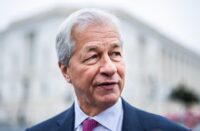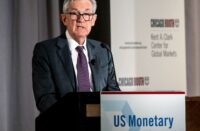Chinese Vice Premier He Lifeng has been actively engaging with senior U.S. finance executives over the past month. This comes as part of Beijing’s proactive approach to fostering relationships in anticipation of the proposed tariffs on China by President-elect Donald Trump.
He Lifeng, who ranks among the top four vice premiers of China, also holds a prominent position as the leader of the Chinese Communist Party’s economic and finance committee. In recent times, he has had meetings with significant figures in the U.S. finance industry. These include Larry Fink, the CEO and Chairman of BlackRock, whom he met in Beijing on December 5, and Goldman Sachs President and COO John E. Waldron, with whom he interacted on December 4, as per reports by state media. In addition, he also had a meeting with Citigroup CEO Jane Fraser on November 21, as confirmed by state media.
According to Peter Alexander, the founder of the Shanghai-based consulting firm Z-Ben Advisors, China is strategically trying to establish connections with those who are anticipated to hold power in Washington under the Trump administration. He further explained that China often prefers this ‘back channeling’ approach to establish communication lines.
While Goldman Sachs acknowledged being aware of these reports, the other two financial firms, BlackRock and Citigroup, have not yet responded to CNBC’s request for comments.
Trump’s chosen Cabinet comprises at least ten reputed billionaires, including Scott Bessent, a hedge fund manager nominated for Treasury secretary, and Howard Lutnick, CEO of Cantor Fitzgerald, proposed for Commerce secretary.
Clark Packard, a research fellow at the Cato Institute, believes that the Wall Street experts joining commerce and treasury are likely to play a balancing role regarding trade protectionism. However, he also anticipates some level of protectionism on the trade side.
Despite the turbulent start of the year, U.S. stocks are projected to record a second consecutive year of gains exceeding 20%. Meanwhile, Chinese stocks have bounced back following Beijing’s move towards stimulus in late September.
As Beijing hosts Wall Street executives and imposes export controls on critical minerals, it’s evident that they are keeping their options open, says Zongyuan Zoe Liu, Maurice R. Greenberg senior fellow for China studies at the Council on Foreign Relations. However, she warns that financial institutions may not be able to do much to alleviate tariffs and tensions with the U.S.
In recent news, He Lifeng also met with Invesco President and CEO Andrew Schlossberg and HSBC Group Chairman Mark Tucker in Beijing. HSBC confirmed the meeting but declined to add any further details, while Invesco has not yet responded to requests for comments.
Winston Ma, adjunct professor at NYU School of Law, emphasizes that U.S.-China capital markets have been a crucial aspect of the bilateral relationship over the last two decades. He suggests that a cooperative and constructive cross-border finance relationship could lead to mutual prosperity, or else it could result in mutual destruction.




